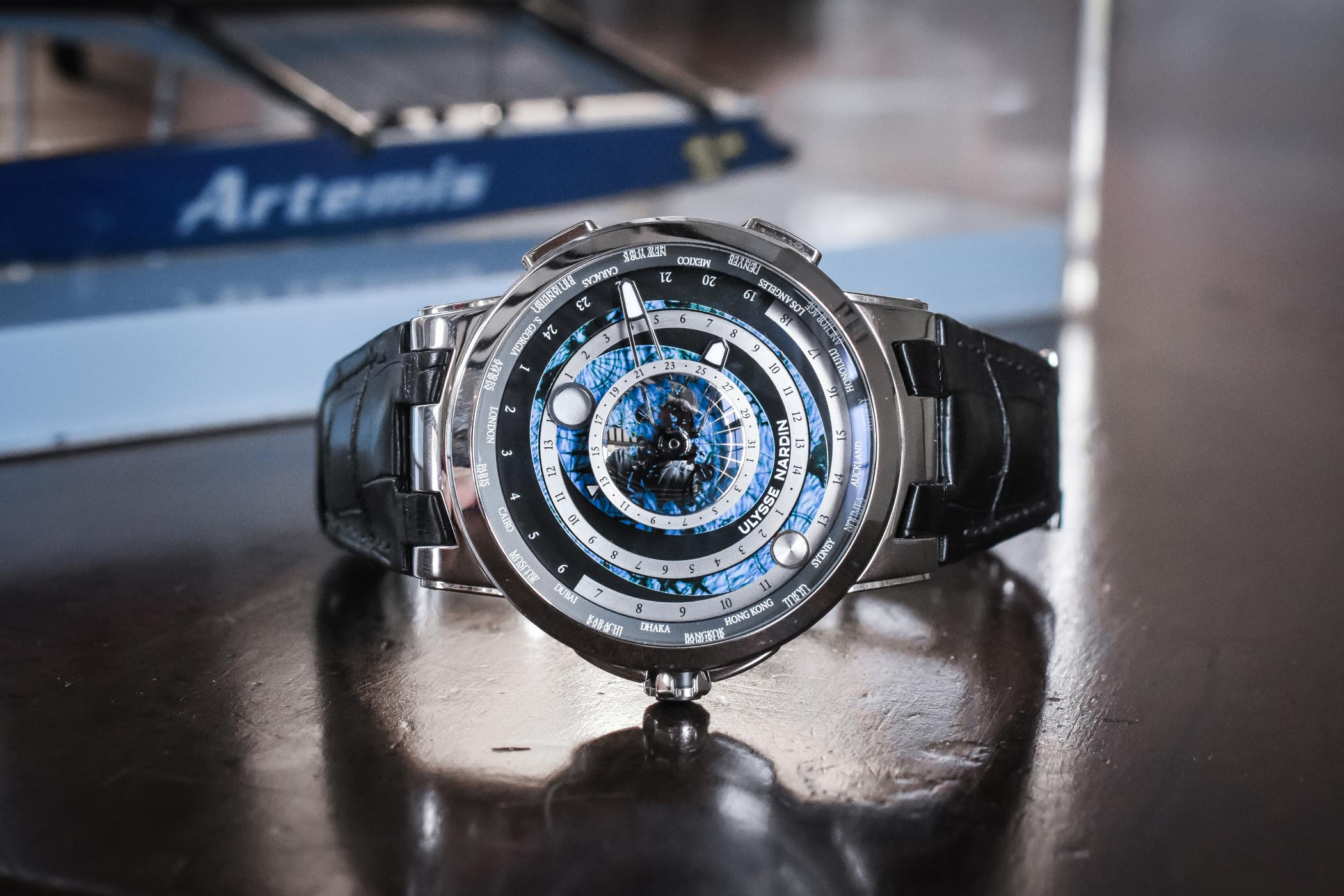Ulysse Nardin Goes Back To Astronomical Watches with the Complex Moonstruck Worldtimer

Ulysse Nardin’s history is deeply linked to Marine chronometers, yet there’s another speciality, rather forgotten, that the manufacture masters (and which is not that far from Marine watches), the astronomical watches. Some may recall the mid-1980s Trilogy – Astrolabium Galileo Galilei (introduced in 1985), Planetarium Copernicus (introduced in 1988) and Tellurium Johannes Kepler (introduced in 1992). This year, UN introduces yet another astronomical watch, the Moonstruck Worldtimer, combining the movements of the moon and sun in relation to the Earth, as well as a map of the tides and (novelty) a world-time display. You say complex, we say exciting.
In a strictly literal definition, there are in fact many astronomical watches on the market… as long as you consider a moon-phase display enough to warrant this definition. Thus, with a watchmaking approach in mind, the concept of an astronomical watch relates to a timepiece with several indications, which can include a star map, the motion of the tides, or the sun, or even the position of the planets in the solar system. There are watches that can tell sunrise and sunset, dawn and dusk, moonrise and moonset, as well as eclipses of the sun and the moon. All of these indications are far from necessary, yet we all know the fascination of humankind for what he actually can’t touch but can only observe. Such frivolous indications become fascinating for some.
While the solar system is composed of a star, eight planets, 175 satellites, and billions of particles, humankind always gave its main attention to only the two celestial bodies which influence our lives: the sun and the moon. These two are given centre stage on the Ulysse Nardin Executive Moonstruck Worldtimer, which recreates the moon’s orbit and the apparent movement of the sun around the globe. Beginning with our own planet, Earth, placed right in the middle of the dial, the two celestial bodies are depicted by discs, rotating around the Earth in a very realistic ballet:
- The Moon appears on a lower orbit – meaning the closest possible from the centre. The Moonstruck Worldtimer is the only astronomical wristwatch with the bright part of the moon always facing the sun, as happens in real life. Two discs work together here: on top, the first functions as a circular window showing the position of the Earth’s satellite; below, the second disc, in gold, shows the changing phases of the moon. This highly complex display is adjusted to an extreme precision, with a deviation of one lunar day in 40 years.
- The Sun appears on a higher orbit – on the periphery of the dial. As in real life, this disc rotates around the dial once every 24 hours and acts as a day-and-night indicator.
This is not the only display that the Ulysse Nardin Executive Moonstruck Worldtimer offers, as indicated by its name. While there was already an “Executive Moonstruck” in the collection, Ulysse Nardin has decided to add the world-time display on this new version – which actually makes sense with the display of the Sun. The Sun disc sweeps over a display of 24 time zones, allowing the Executive Moonstruck Worldtimer to simultaneously display the time in the 24 cities inscribed on the internal flange. A date, placed on the periphery of the central map complements this rather display. Finally, as if all that were not enough, the Moonstruck Worldtimer also displays a map of the tides (which is the result of the gravitational forces of the Sun and the Moon), thanks to the lower blue map.
The Ulysse Nardin Executive Moonstruck Worldtimer is presented in the traditional, yet bold case with these typical lugs found in many of the watches produced by the manufacture. The case, which is available in 18k rose gold or 950 platinum, measures 46mm. A large watch for sure, however with so many indications on the dial, it remains a wearable piece of high-end watchmaking.
Inside the case is an in-house developed and manufactured movement, the calibre UN-106. As usual, it features silicon technology, for the escapement and hairspring (UN was a pioneer in this silicon technology). The UN-106 beats at 4Hz and boasts a 50h power reserve, through a self-winding mechanism. Push buttons at 8 and 10 enable the wearer of the Ulysse Nardin Executive Moonstruck Worldtimer to quickly move the time forward or backwards by one hour, a handy feature while travelling.
The Ulysse Nardin Executive Moonstruck Worldtimer is a limited edition of 100 pieces, priced at 75,000 Euro/CHF in rose gold – 95,000 Euro/CHF in platinum. Even if not the most intuitive or discreet piece available on the market, this watch should be considered, just because it’s one of the few astronomical timepieces you’ll find, and one with properly fascinating indications. More details on www.ulysse-nardin.com.
Technical Specifications – Ulysse Nardin Executive Moonstruck Worldtimer
- Case: 46mm diameter – 18k rose gold or 950 platinum – sapphire crystal on both faces – screw down security crown – 100m water resistant
- Movement: Calibre UN-106, in-house – automatic – 4Hz frequency – 50h power reserve – silicon escapement and spring
- Indications: Astronomical timepiece – Indication of position of Sun and Moon in relation to Earth Indication of Moon phases – Indication of tides – Worldtimer function for 24 cities – Hours, minutes, date – Instant time zone adjuster with patented quick setting device
- Strap: black alligator strap with folding clasp
- Price: 75,000 Euro/CHF in rose gold – 95,000 Euro/CHF in platinum
- References: 1069-113/01 – 1062-113/01










1 response
Just wonder whether it’s the work of Dr. Ludwig Oechslin as well ?